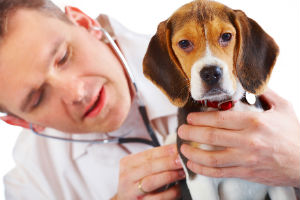Heart BEATS: “Little Things Can Cause Your Pet Big Pain”
Published on August 16, 2012

I was having a sleepless night, so I had a lot of time to think. For some reason, I got to thinking about all the maladies pet owners sometime see as minor anomalies or ignore completely that must be excruciatingly painful or uncomfortable.
Take bugs. Can you imagine being a cat and having ear mites crawling around in your ears? Or how would you like to be a dog with fleas or mites, parasites that bite or burrow in your skin? How about having just one infected tooth (let alone a mouth that's so inflamed it looks like it was torched with a flame thrower) that throbbed during the night or hurt so bad you couldn't eat? A slipped disc in the back that makes almost any movement miserable? Can you imagine being a cat with a urinary-tract problem, the burning or straining every time you use the box? How about struggling to breathe because of heartworms?
I've personally never had my ears crawling with mites or my cardiovascular system filled with worms, but I have had a sore tooth, a urinary-tract problem and a slipped disc in my back and all three of those made me want to cry out for my momma! We all know pets can't talk. They can't tell us how they hurt themselves, where it hurts, or when it hurts the worst. At least not verbally. That's where paying close attention to your pet can help detect these problems early on. Is the pet scratching its head or biting at the base of his tail? Probably parasites or an infection. Doesn't want to play with his toy? Could be an abscessed tooth or oral infection. Trouble rising to his feet or jumping on the couch or climbing stairs? Might be a slipped disc or arthritis. Not using the litter box, straining or a little blood in the litter? Chances are it's a urinary tract infection. Exercise intolerant, coughing, losing weight? It could very well be heartworm disease.
I stayed awake that night worrying about all those pets who suffer in silence and whose problems remained undetected or untreated. We know that 80 percent of the primary caregivers of pets are female, so let me speak to all the "Doctor Moms" out there. Pay extra special attention to your pet's everyday habits and don't assume anything. Has your pet's weight, appetite, thirst, bathroom habits or activity levels changed? Does your pet just act “different”? Don't just assume it's because it's hot, cold, your pet is getting old, or it's just one of those things.
Rely on regular visits to the veterinarian to detect problems early on before they cause unnecessary pain, expense or worse. Veterinarians have the training and experience to look past obvious problems to potential problems. We know the conditions that affect certain breeds, maladies that rear their heads at certain ages, and we hear of emerging health threats. Heck, we might even know your pet's mother or grandmother.
Between your careful attention and regular veterinary care, no pet needs to suffer. It's a small portion of what we can return to those that give so much of themselves to ensure our health and happiness.

